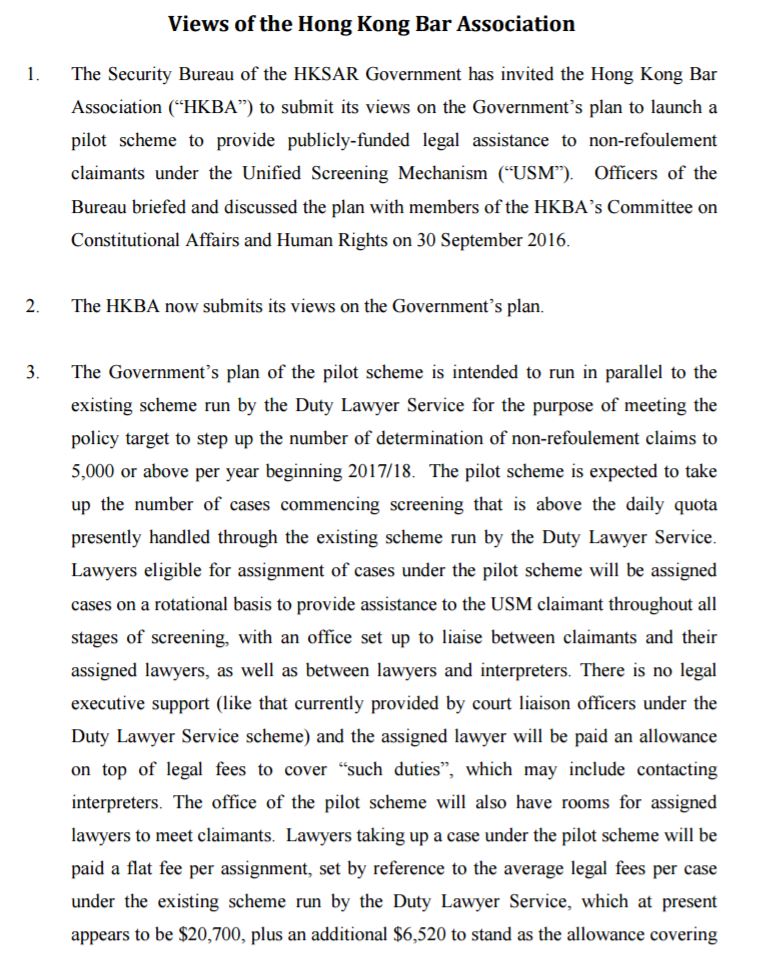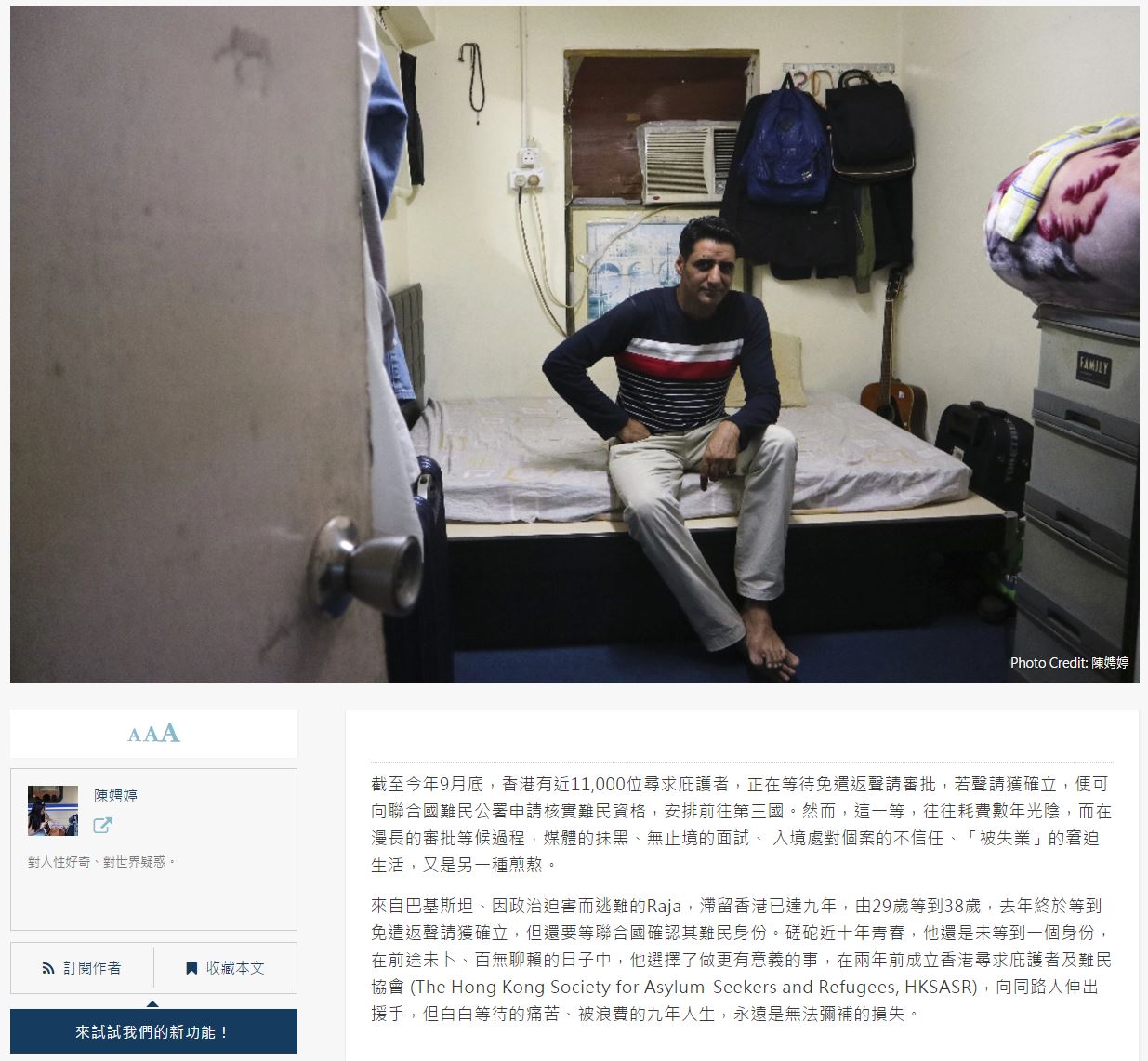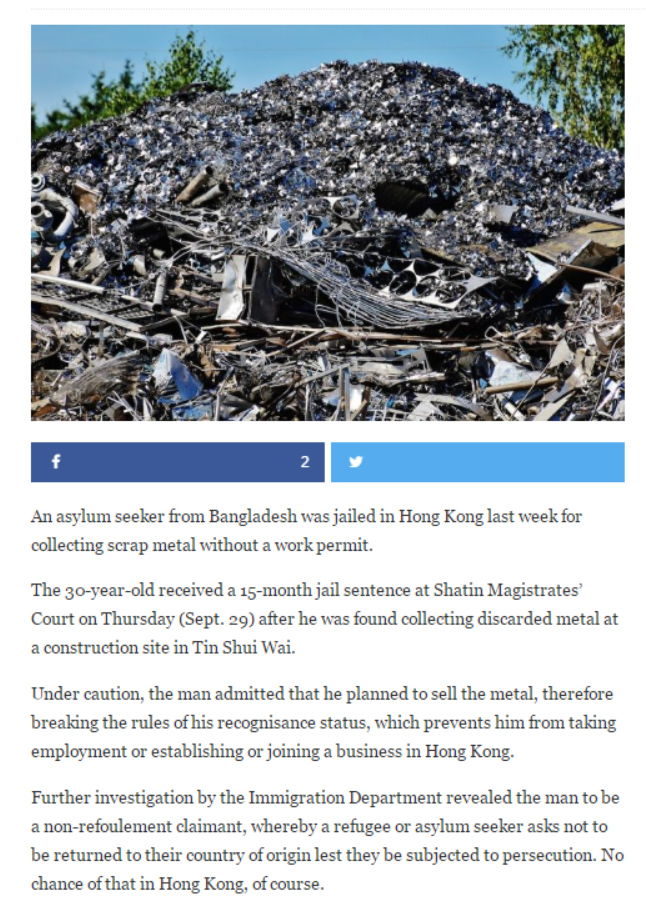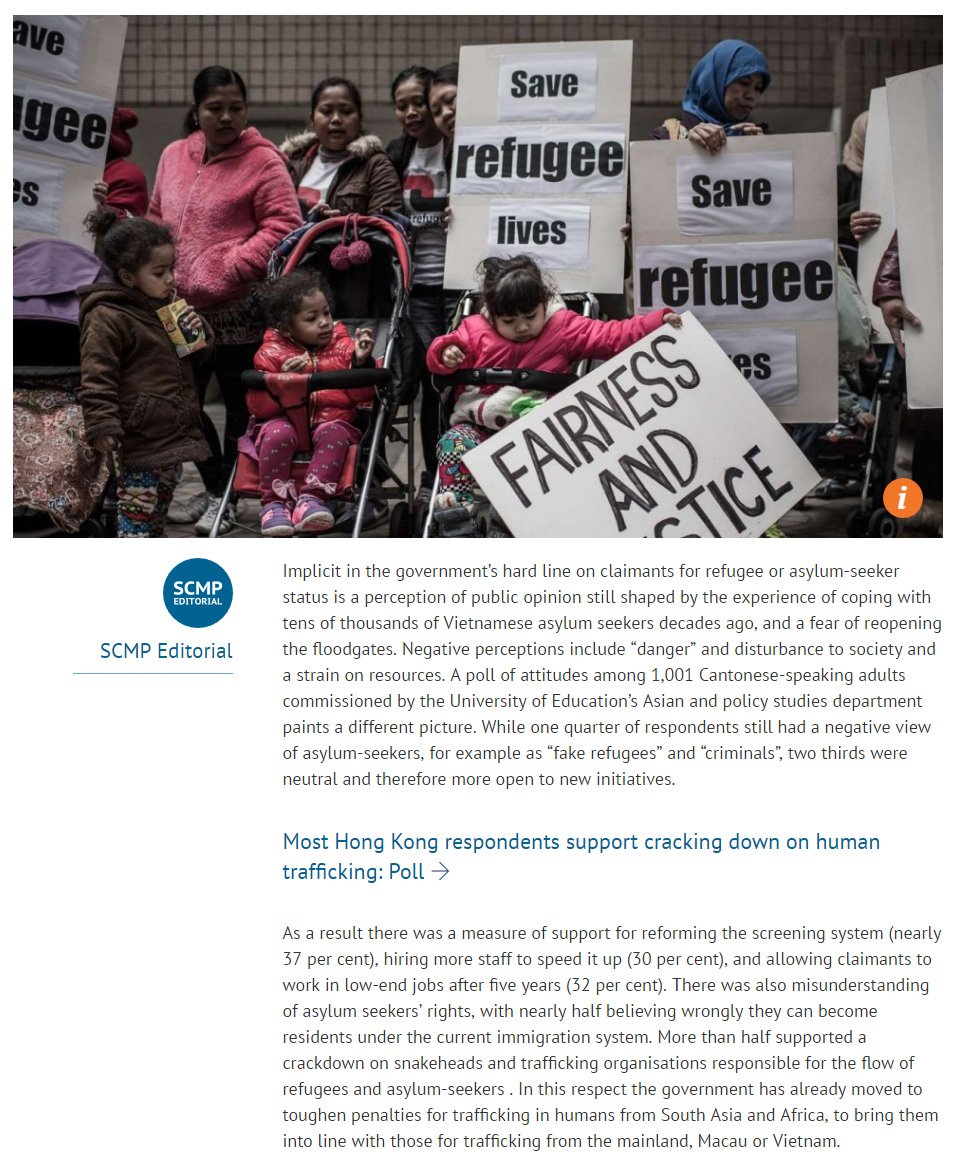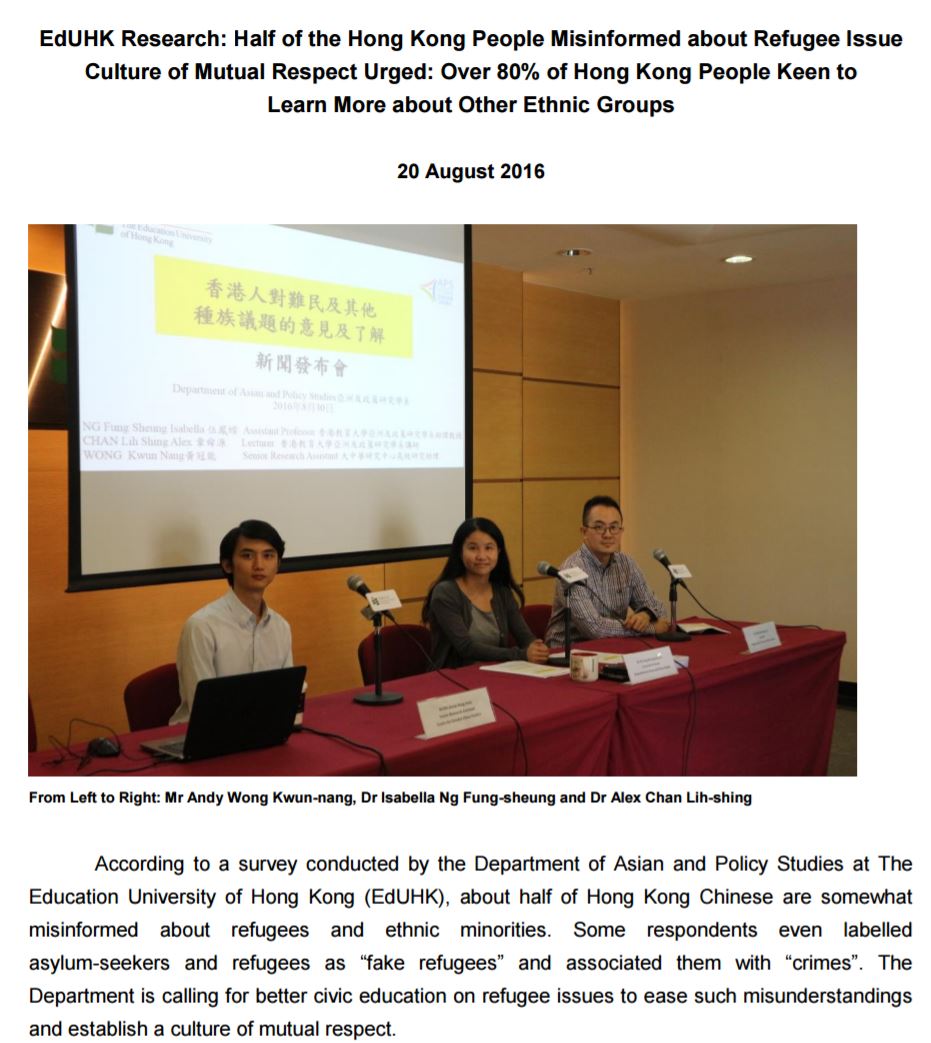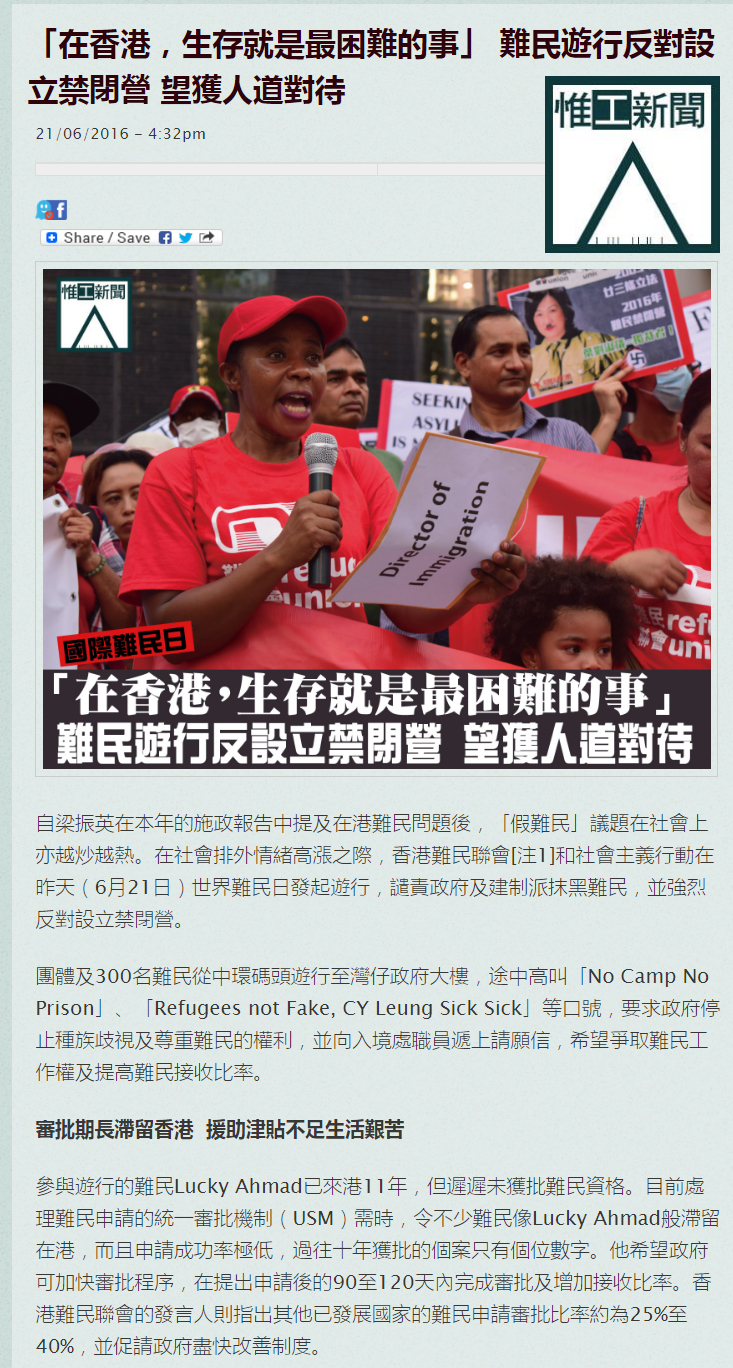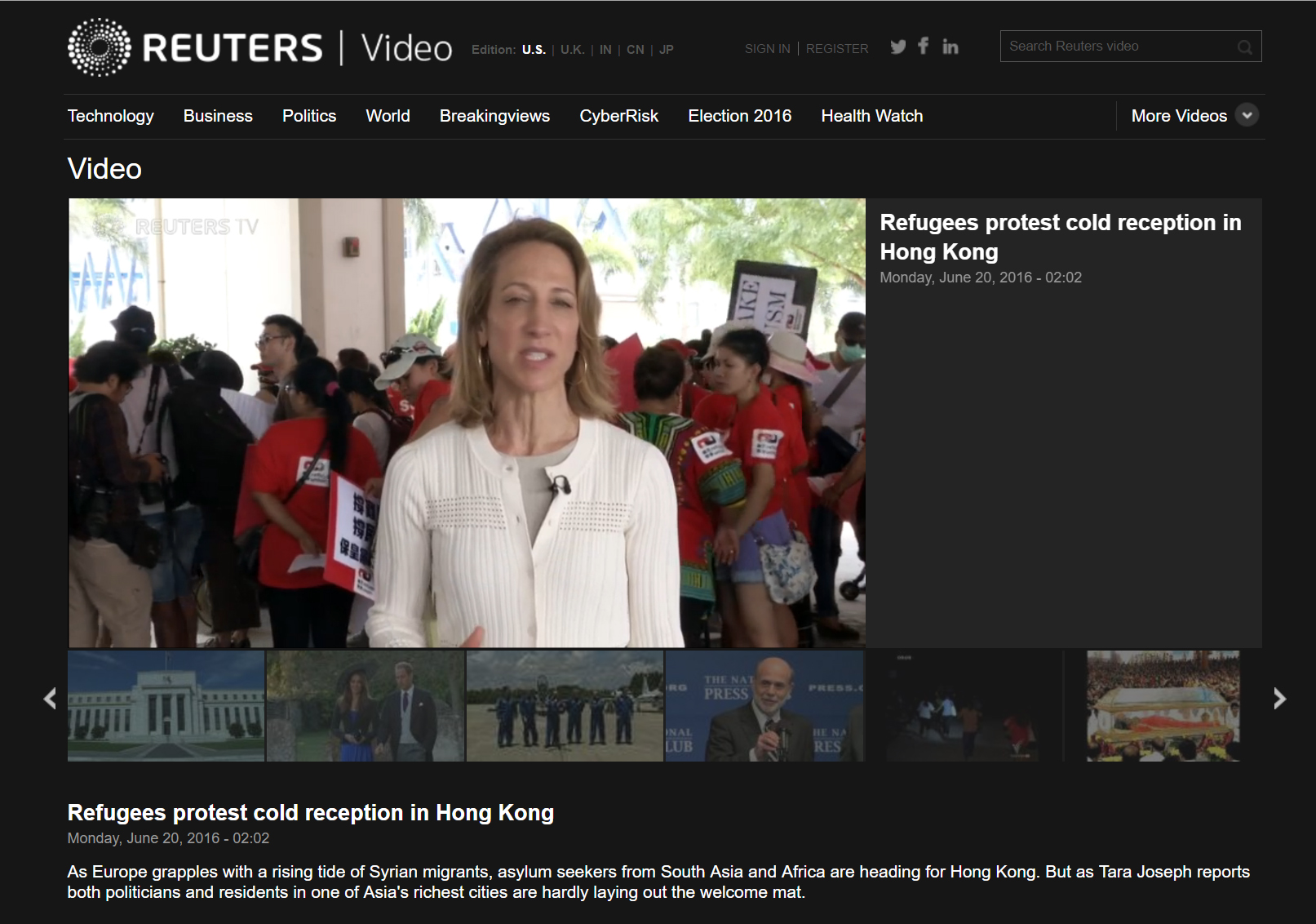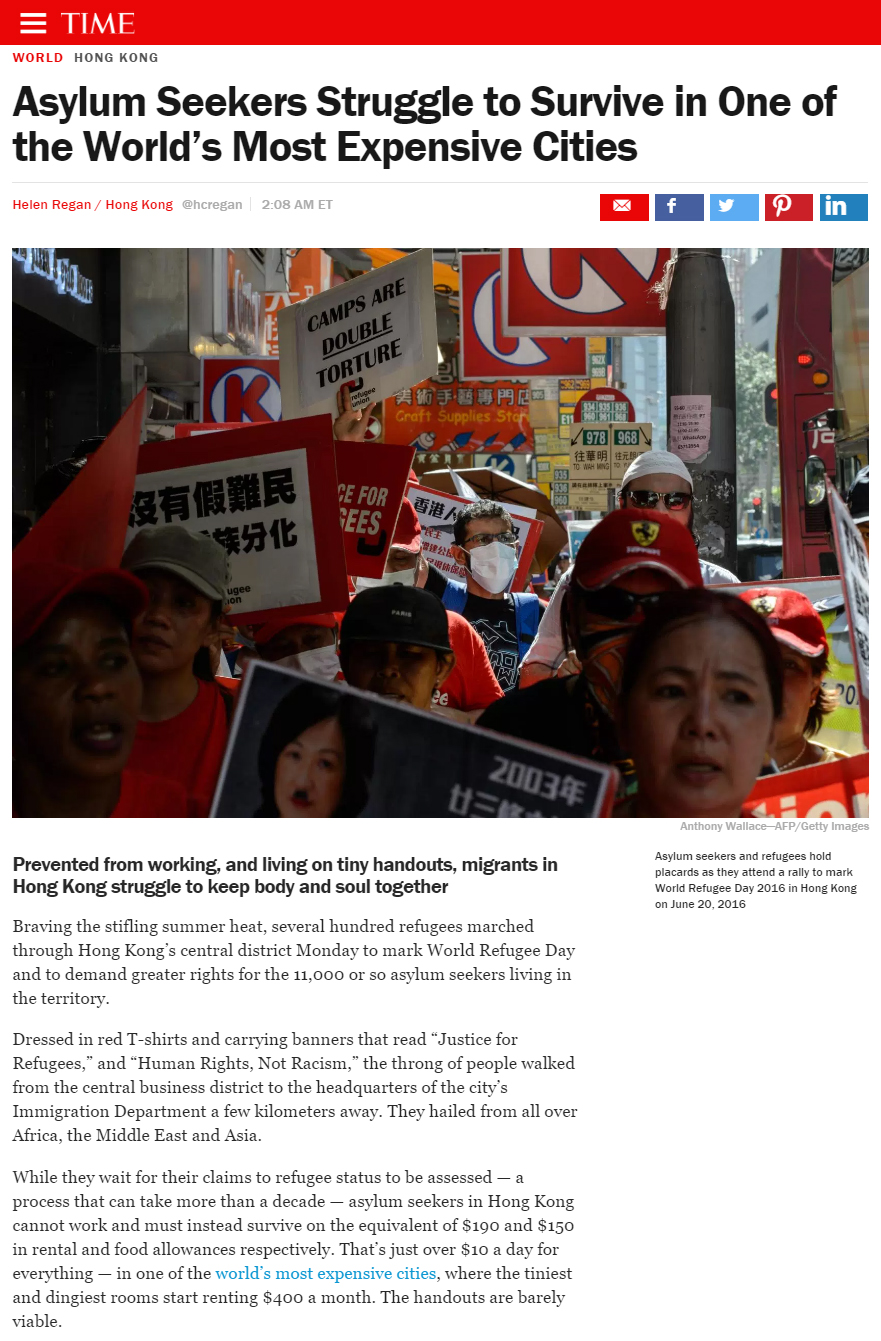HKBA critical of new pilot scheme for free legal assistance to refugees
Nov 29th, 2016 | Government, Immigration, Legal, Rejection | Comment
滯港難民:浪費九年青春,等不到一個身份
Nov 29th, 2016 | Media, Personal Experiences, Refugee Community, Rejection, Welfare | Comment
Asylum seeker jailed for collecting scrap metal to make ends meet
Oct 3rd, 2016 | Media, Rejection, Welfare | Comment
Signs of tolerance of refugees is a chance for the government to reform the asylum system
Sep 5th, 2016 | Media, Rejection | Comment
Is the noose tightening around the neck of refugees?
Sep 1st, 2016 | Advocacy, Crime, Housing, Immigration, Rejection, VF Opinion, Welfare | Comment
Vision First attended court yesterday to witness two refugee members being prosecuted for allegedly working unlawfully. The prosecutor revealed that the employer will testify as a witness. Bail was denied.
Let’s stop and think. Wouldn’t it normally be the case that prosecutors seek the assistance of the unlawfully employed persons to indict unscrupulous employers, rather than the other way around? Generally speaking, how can refugees conscientiously abide by the law when the material assistance they received fails to meet their most basic needs, rent in particular?
Aside from promoting a regrettable form of xenophobia and widespread misinformation, it appears that the Government is accomplishing little more than slamming the door shut for refugees who mistakenly hoped for a more favorable outcome when seeking refuge in Hong Kong.
A plethora of problems germinates in the the well-known failures of the Unified Screening Mechanism to then spread through various branches of government tasked with dealing with refugees and finally reach deep down in the underground economy where a growing number of destitute asylum seekers are forced to find informal relief.
First, one might consider the statistics published by the Immigration Department informing that, between 2009 and 2016, just 55 of 9214 asylum claims were substantiated. This equates to a success rate of 0.6% for seeking asylum in Hong Kong compared to 30-50% in European countries, for example. Despite authorities being quoted as saying that this rate is indicative of abuse, one might question the credibility of the process that rejects 166 for every 1 case accepted.
That being said, few people realize that successful claimants do not earn the right of abode, will not get ID cards, are prohibited from working under penalty of 36 month prison (maximum sentence) and, together with the other 11,169 asylum seekers, must rely on a monthly assistance of 1200$ in food coupons, 1500$ in rent assistance and about 500$ for utilities and transport.
Second, packaged as ‘humanitarian assistance’ the above assistance was designed to remove the sting of destitution in one of the most expensive cities in the world. That is of little consolation for eleven thousand men, women and children who are expected to cope gratefully, or face hefty prison sentences for ‘breaking the law’ by earning necessary cash on the side.
Such ‘humanitarian assistance’ is in fact more a curse than a blessing. It pulls a seemingly compassionate mask over a draconian policy designed to quash hope in recipients. Overworked magistrates swiftly conclude that as welfare is provided, refugees who work illegally deserve to be incarcerated 15 to 22 months according to plea. Thus sentencing is reduced to little more than ticking the boxes with no consideration of real life circumstances.
Third, the rental crisis is spiraling towards an abyss. On the one hand, contrary to general trends, prices for subdivided rooms have increased to at least 3000$, and availability is very scarce. On the other hand, the SWD contractor ISS-HK is reported by refugees to have started to demand they produce letters from resident sponsors endorsing rent surpluses before new tenancy agreements are accepted for the disbursement of the meagre rent assistance. This could prove challenging.
While some refugees may resourcefully raise funds, these are largely informal arrangements with friends, partners, donors and churches/NGOs that might not translate into sponsorship agreements. “People are going to lose their rooms and become homeless” commented a refugee who visited Vision First for advice.
Fourth, an increasing number of refugees report that the Immigration Department demands detailed written significations. On the one side, the time it takes to lodge new claims is increasing, thus preventing destitute claimants from obtaining assistance. On the other, those whose application fails on signification are likely to abscond and are thus prevented from obtaining assistance. It isn’t hard to guess that these refugees will find support in the underground economy where also the lure of criminal activity is strong.
Fifth, applications for “BOR 2 Claims” appear to be denied to a greater extent than before (Hong Kong Bill of Rights Ordinance, Art. 2). Until recently they were the last resort for rejected USM claimants fearful of imminent removal. Since it seems the government has yet to formulate a policy to deal with these claims, rejecting such applications might be a way contain a problematic surge. However, encouraging refugees to go underground creates graver problems. The maxim “better the devil you know than the devil you don’t” ought to be considered.
Sixth, residents employ refugees due to a severe shortage of unskilled labour. For undocumented workers, monthly salaries in restaurants are up to 8000$ for washing dishes and 15,000$ for cooking. A team can be paid as much as 10,000$ to unload heavy containers, irrespective of time; while the pay is about 600$ a day for demolition work in flats and for night shifts repairing roads for government contractors. Refugees are indeed sought after, and encouraged to introduce friends, because local workers turn their nose on strenuous work, or expect higher payment. In this respect, the government ought to consider a “migrant labour scheme” which refugees could join with an agreement to leave Hong Kong afterwards.
Seventh, a blatant inconsistency in criminal sentencing makes it attractive for desperate refugees to engage in criminal activity such as theft, soliciting or drug trafficking, rather than perform licit work as detailed above. For example, it has come to our attention that refugees might be sentenced to 8 months in prison for trafficking, 4 months for soliciting and a few weeks for shoplifting. Irrespective of moral concerns and social deviancy, the obvious imprisonment advantage is a factor.
These issues combine to overwhelm refugees who are first failed by the government departments tasked to protect and assist them, and then exploited by landlords and employers who unashamedly prey on their need for cash. And when refugees are caught red handed, they are the ones to bear the consequences and the full weight of the law. Indeed, as a perceptive refugee succinctly put it, “Hong Kong is a closed club”, and membership is protected.
It comes as no surprise that certain media outlets foment the flames of propaganda reporting every transgression by refugees who find the noose tightening around their neck in an increasingly toxic and unsustainable environment.
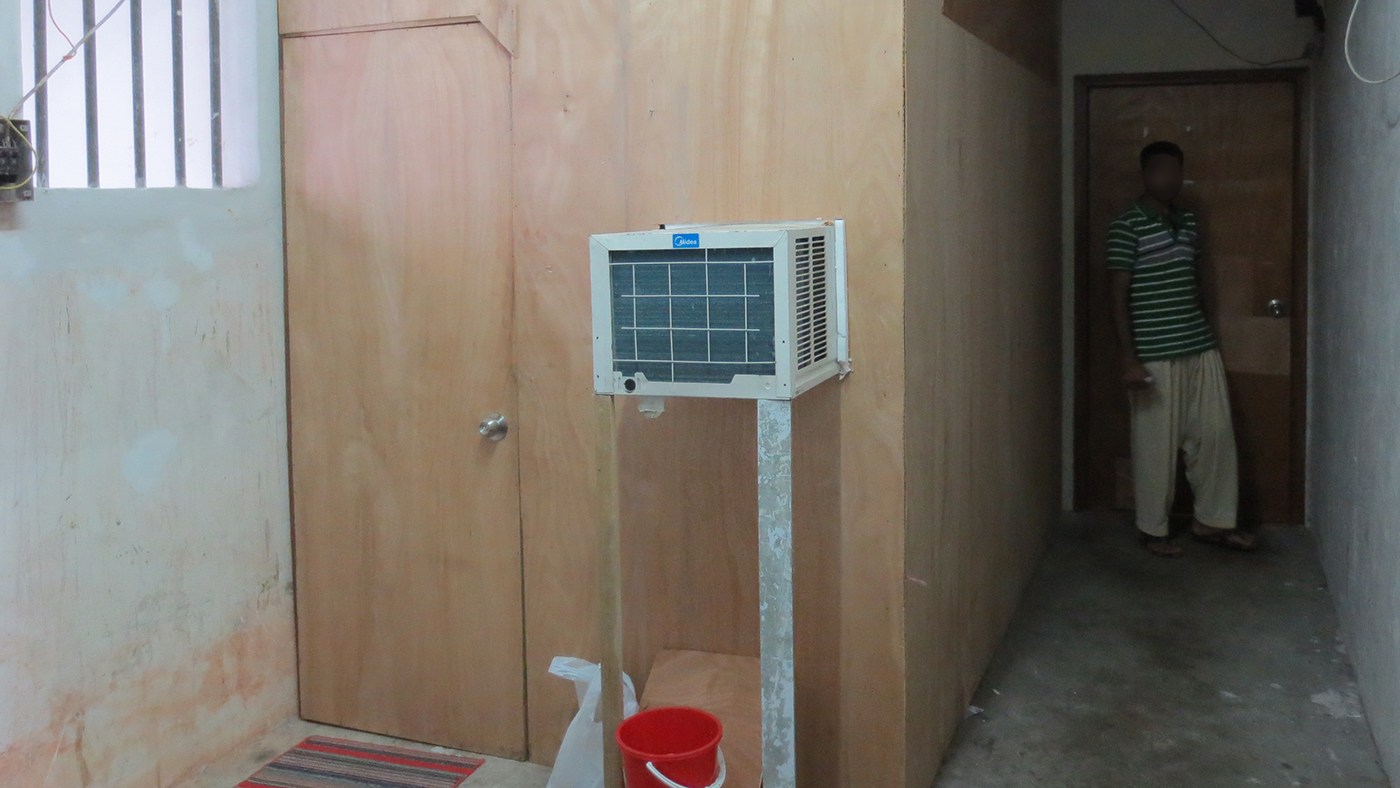
Immigration violates law by delaying opening claims to deter new asylum seekers?
Aug 24th, 2016 | Government, Immigration, Personal Experiences, Rejection, VF Opinion, Welfare | Comment
Vision First finds it unacceptable that delays by the Immigration Departments in opening non-refoulement claims might compel new asylum seekers to risky behaviour, if not criminal activity, to secure food and shelter. As an example, we report the case of Jenny (not her real name), a woman made vulnerable to sexual exploitation by the long wait she is enduring to access welfare services.
Jenny’s first trip outside her country was a long flight to Guangzhou where she was promised an attractive job in a garment factory. Jenny was experienced. She had supervised a team of seamstresses in a textile factory in her country. However, when the sweet promises of a local ‘employment agent’ allured her to a higher salary in China, she accepted.
The agent arranged Jenny’s passport and promised her parents a cash gift when their daughter arrived in China, as a token of the remittances she would soon be sending back to improve their lives. With so many clothes labelled with “Made in China”, it wasn’t hard for the 24 year-old to believe that a rewarding job in a modern factory awaited her.
The agent accompanied Jenny on the flight to Guangzhou and then to Fuzhou where she met with Chinese counterparts who paid her 70,000 RMB for the ‘new hire’. It wasn’t long before Jenny discovered there was no factory, no job and no salary. Instead, there was an older Chinese man who would take Jenny as his ‘wife’ for three months in sexual slavery. Jenny had been duped and trafficked. Today she fights back tears explaining that other women were given to several ‘husbands’.
In April 2016 the traffickers arranged her travel to Hong Kong to renew her China visa. The handlers held her passport, but apparently failed to control her day and night, thus providing Jenny an opportunity to escape. Jenny finally confided in a stranger who turned out to be a member of the Refugee Union. Jenny then sought asylum in Hong Kong. Traffickers are known to kidnap and torture escapees who naively return home where police protection is unavailable.
It’s been four months since Jenny applied with the Immigration Department and still her Unified Screen Mechanism (USM) claim has not been duly opened. As of consequence, despite being issued with an Immigration Recognizance Form, Jenny has been unable to access support from the Social Welfare Department. Her name is allegedly not on the computer database that SWD officers check to establish eligibility for assistance.
Jenny explained to Vision First that Immigration officers seemingly delay opening her asylum bid because an interpreter cannot be found. She is not alone in lamenting what we argue is a blatant protection failure. It is indeed hard to accept that for Jenny, and others known to Vision First, Immigration officers maintain there are no French interpreters available. There are over 80,000 French nationals in Hong Kong. Surely a number of them must be seeking a living as registered interpreters.
Protection fails when the Immigration Department’s inability to promptly provide interpretation causes Jenny, a victim of trafficking for sexual exploitation, to live on the streets, where she begs for food and shelter. Her vulnerability is further augmented by her feeling compelled to engage in the very behaviour she fled to seek protection in Hong Kong in the first place!
It is regrettable that Jenny is in crowded company in this “life-before-asylum crisis” because the Immigration Department postpones the opening of new asylum claims, presumably hoping that claimants will just give up and leave?
In addition, Vision First is troubled by a second crisis directly connected to this one, namely the frequent rejection of applications before asylum seekers are offered a chance to obtain free legal advice, as required by law. The following reason is often given to would-be asylum seekers whose bid is rejected: “Your written signification does not give a general indication of your reasons for claiming non-refoulement protection in Hong Kong, being reasons that relate to an act falling within the meaning of torture, BOR3 and/or persecution risk.”
One should be reminded that Hon. Judge Saunders argued in the FB Judgment that: “It is only sensible that the (Immigration) Department should take a broad and liberal view of statements of risk or danger upon return to their country of origin, made by any person who does not have the right of abode in Hong Kong. To insist upon a particular formula being expressed by a person would be contrary to the high degree of fairness required by Prabakar, and would be tantamount to sitting back and putting the person concerned to strict proof of the claim.” (HCAL 51/2007)
There are “no magic words” to be use by claimants seeking asylum. No special words are necessary in the first letter that triggers Hong Kong Government’s international obligation towards refugees.
However, we cannot but question the Immigration Department’s treatment of vulnerable asylum seekers who are denied timely protection, and thus vital welfare, despite being in an obvious state of destitution – their risky behaviour being proof of such immiserating conditions.
The law is not always right, but the magic words argument is clear, and in these cases it appears to be blatantly violated.
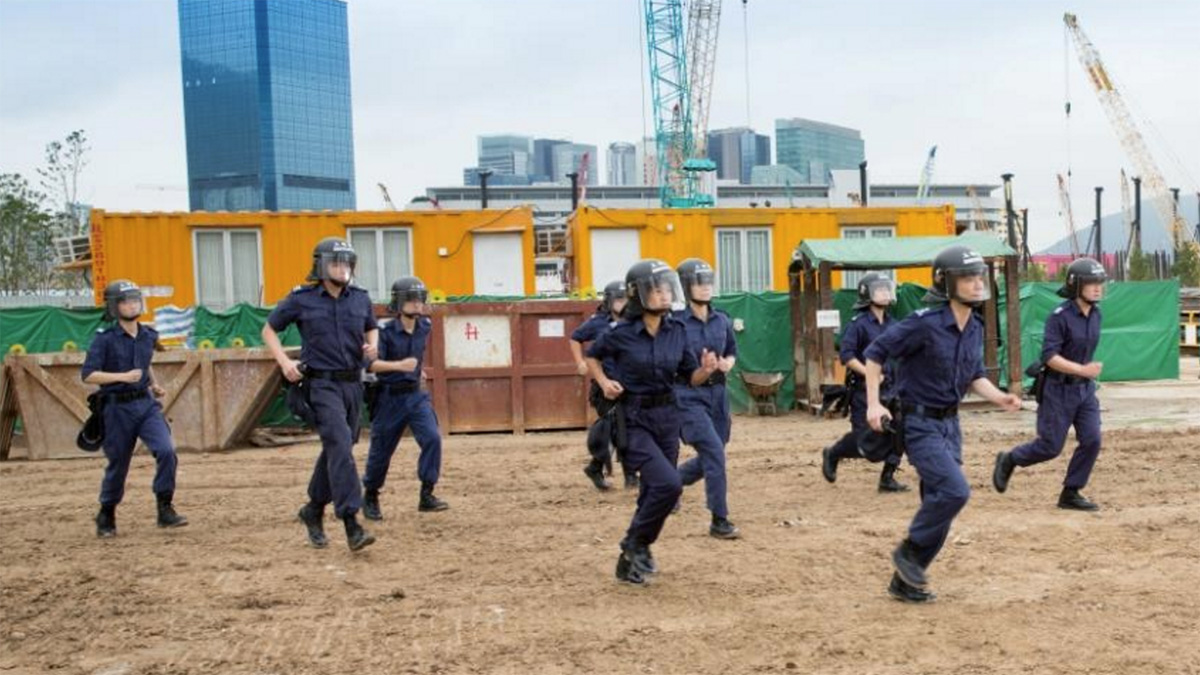
Half of the Hong Kong People Misinformed about Refugee Issue
Aug 20th, 2016 | Immigration, Media, Racism, Rejection | Comment
Refugee rally seeks fair treatment from the Government
Jun 22nd, 2016 | Advocacy, Media, Refugee Community, Rejection | Comment
Refugees protest cold reception in Hong Kong
Jun 22nd, 2016 | Media, Refugee Community, Rejection | Comment
Asylum Seekers Struggle to Survive in One of the World’s Most Expensive Cities
Jun 22nd, 2016 | Media, Refugee Community, Rejection | Comment


